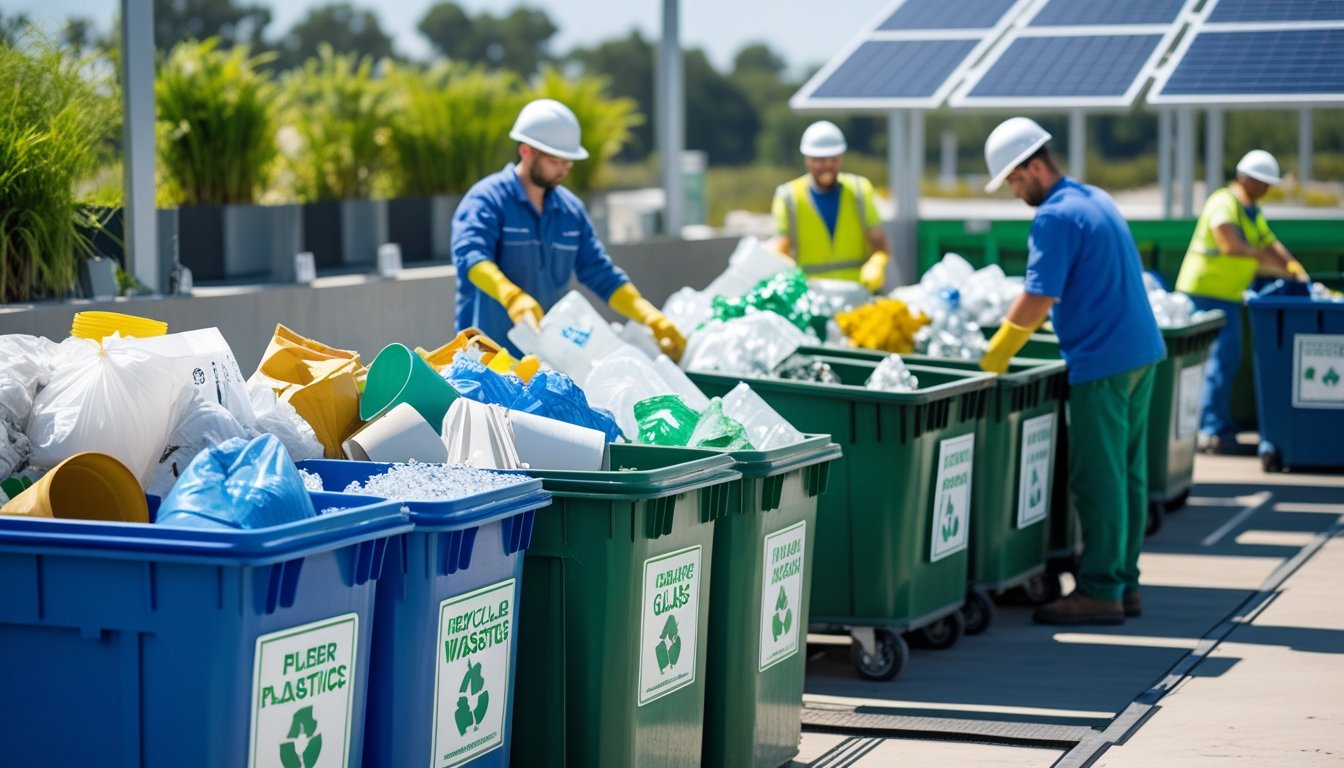Late updated: 07 Jul 2025 15:07
Written by: Sarah Hollister
Benefits Of Eco-Friendly Waste Management Solutions: Sustainable Practices for a Greener Future
Embracing eco-friendly waste management solutions is essential for the health of our environment and communities. As the global population and consumption levels rise, effective waste management becomes an urgent necessity. By adopting sustainable practices, we can significantly reduce the environmental impact of waste disposal and promote resource conservation. These practices not only minimise greenhouse gas emissions but also foster a healthier planet by conserving natural resources and reducing pollution.

Eco-friendly waste solutions offer several compelling benefits that extend beyond environmental impacts. They support economic growth by reducing costs associated with waste disposal and create job opportunities in recycling and recovery industries. Furthermore, sustainable waste management methods encourage innovation and community initiatives, strengthening local economies and enhancing public awareness of environmental stewardship.
Our exploration will delve into the core benefits and strategies of sustainable waste management, aiming to equip readers with practical knowledge and inspire meaningful change. With increasing awareness of environmental issues, we can collectively move towards more responsible and eco-conscious waste solutions that benefit society at large.
Key Takeaways
- Eco-friendly waste management reduces environmental impact.
- These methods support economic growth and create jobs.
- Sustainable practices encourage innovation and awareness.
Core Benefits of Eco-Friendly Waste Management Solutions
Eco-friendly waste management offers significant advantages. These include reducing pollution and optimising natural resources. These practices promote responsible handling of waste materials and champion the transition towards sustainable systems.
Reducing Environmental Impact
Through eco-friendly waste management, we can significantly lower our ecological footprint. By focussing on waste reduction and waste diversion, harmful materials are prevented from entering ecosystems. This reduces pollution and minimises reliance on landfills. Landfill use is a major source of methane emissions, which contribute to climate change. Composting and recycling help mitigate this by ensuring organic and reusable materials do not go to waste. Furthermore, eco-friendly methods lessen water and soil contamination by discouraging improper disposal. Effective waste practices thus play a crucial role in preserving biodiversity and promoting environmental responsibility.
Improving Resource Efficiency
Resource efficiency is at the heart of sustainable waste management. By implementing strategies that emphasise recycling and the reuse of materials, we significantly decrease the need for new resources. This reduces strain on raw materials, leading to energy savings and a decrease in greenhouse gas emissions from production processes. Additionally, adopting eco-friendly practices fosters mindful consumption and production patterns, encouraging industries to use less virgin material. Such efficiency not only conserves natural resources but also reduces operating costs over time. The end result is a system that is beneficial both for the economy and the environment.
Supporting a Circular Economy
A circular economy is fostered through initiatives such as recycling, waste-to-energy technologies, and product design for longevity and reparability. By sustaining resources within the production cycle, we can create a closed-loop system that maximises resource use. Waste becomes a resource rather than a byproduct, thus promoting continuous material flow. Supporting a circular economy also spurs innovation, as industries collaborate to develop sustainable processes and products. This approach contributes to reducing waste generation and enhances the resilience of supply chains. A circular economy represents a shift from wasteful supply chains towards sustainable practices.
Key Methods and Strategies in Sustainable Waste Management

In sustainable waste management, employing effective techniques can greatly contribute to reducing environmental impact. Key methods include recycling practices, composting of organic waste, and innovative waste-to-energy technologies.
Recycling and Waste Sorting Practices
Recycling is a cornerstone of reducing environmental burden. By implementing recycling programmes, we can effectively manage waste materials by sorting them into categories such as plastics, metals, and glass. Proper waste sorting ensures that recyclable items do not end up in landfills, thus conserving natural resources. Programmes typically involve community engagement and accessible drop-off points. By educating communities on the importance of sorting waste, we enhance the effectiveness of recycling and create a culture of sustainability. Transparent recycling practices also provide economic value by reducing costs associated with waste management and by creating jobs in the recycling sector.
Composting and Organic Waste Processing
Composting transforms organic waste like food scraps and garden waste into nutrient-rich soil amendments. This process involves breaking down biodegradable materials into compost through natural decomposition. Not only does this reduce waste sent to landfills, but it also enhances soil health by returning valuable nutrients to the earth. Anaerobic digestion is another method that processes organic waste to produce biogas while simultaneously curbing methane emissions. By developing local composting facilities and supporting community composting initiatives, we can efficiently process organic waste and foster sustainable agricultural practices.
Innovative Waste-to-Energy Technologies
Waste-to-energy technologies convert non-recyclable waste materials into usable energy forms like electricity or heat. Techniques such as gasification break down waste at high temperatures, producing a synthetic gas that can generate power. This process not only diminishes the volume of waste in landfills but also offers an alternative source of energy. By investing in these technologies, we reduce reliance on fossil fuels and encourage a more circular economy. As we integrate waste-to-energy solutions, we can manage waste sustainably while supplying renewable energy to our communities.
Frequently Asked Questions

Our investigation into eco-friendly waste management addresses common inquiries about its numerous advantages. By exploring the role these practices play in urban settings, pollution reduction, community benefits, successful models, and their impact on sustainability and resource conservation, we highlight the tangible benefits of these solutions.
What are the main advantages of implementing sustainable waste management practices in urban areas?
Adopting sustainable waste management in urban areas leads to reduced landfill use and greenhouse gas emissions. Additionally, it helps improve air and water quality. Cities can benefit economically by saving on disposal costs and attracting environmentally conscious businesses and residents.
How can eco-friendly waste management solutions contribute to reducing pollution?
Eco-friendly waste solutions minimise pollution by promoting recycling and reuse, reducing the need for new resource extraction. Composting organic waste decreases methane emissions, while biodegradable materials prevent toxic leachate in landfills. These practices collectively lower soil and water contamination.
In what ways does the community benefit from the adoption of green waste disposal methods?
Green waste disposal fosters a healthier community by reducing exposure to pollutants and toxins. It also supports local economies by creating jobs in recycling and composting industries. Additionally, public awareness initiatives often lead to more environmentally conscientious behaviours among residents.
What examples of successful sustainable waste management models can be shared to demonstrate their effectiveness?
Cities like San Francisco and Stockholm exemplify successful sustainability models. They have implemented comprehensive waste separation and composting programmes, achieving high recycling rates and reducing landfill dependency. These initiatives demonstrate a practical path towards sustainable urban living.
Could you explain the role of waste management in achieving broader environmental sustainability goals?
Eco-friendly waste management is integral to sustainability, as it supports the circular economy by keeping resources in use longer. By reducing waste and encouraging recycling, we minimise the need for new materials and energy-intensive production, consequently mitigating environmental degradation.
How has the introduction of sustainable waste practices impacted the conservation of natural resources?
Sustainable waste practices help conserve natural resources by reducing the demand for raw materials. Recycling limits the necessity for virgin resource extraction, while practices such as composting enrich soil, promoting healthier plant growth and lessening the need for chemical fertilisers.
